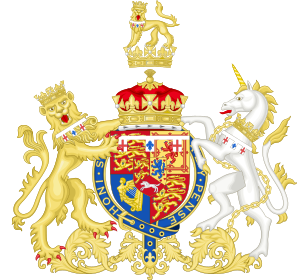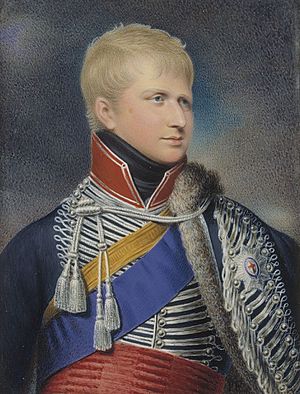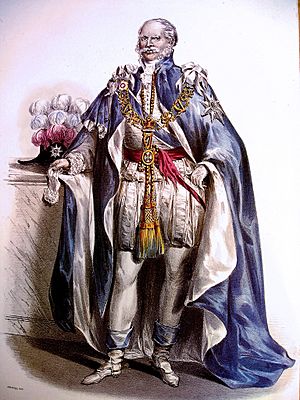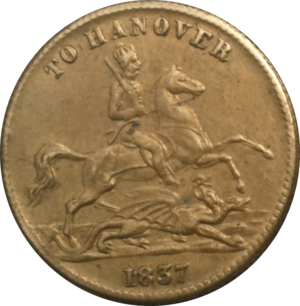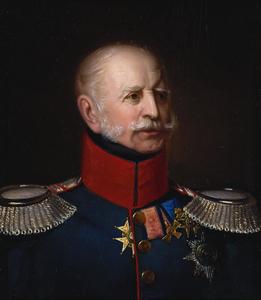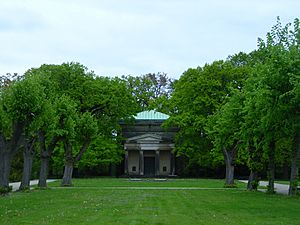Ernest Augustus, King of Hanover facts for kids
Quick facts for kids Ernest Augustus |
|
|---|---|
| Duke of Cumberland and Teviotdale | |
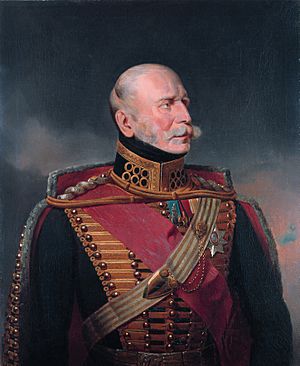
Portrait by Edmund Koken, after 1842
|
|
| King of Hanover | |
| Reign | 20 June 1837 – 18 November 1851 |
| Predecessor | William IV |
| Successor | George V |
| Born | 5 June 1771 Buckingham House, London, England, Kingdom of Great Britain |
| Died | 18 November 1851 (aged 80) Hanover |
| Burial | 26 November 1851 Herrenhausen Gardens, Hanover |
| Spouse |
Frederica of Mecklenburg-Strelitz
(m. 1815; died 1841) |
| Issue | George V of Hanover |
| House | Hanover |
| Father | George III |
| Mother | Charlotte of Mecklenburg-Strelitz |
| Religion | Protestant |
| Signature |  |
| Member of the House of Lords Lord Temporal |
|
| In office 23 April 1799 – 18 November 1851 |
|
| Military career | |
| Allegiance | |
| Service/ |
Hanover Army |
| Years of active service | 1791–1813 |
| Rank | Field Marshal (active service) |
| Unit | 15th Light Dragoons |
| Commands held |
|
| Battles/wars | |
Ernest Augustus (German: Ernst August; 5 June 1771 – 18 November 1851) was the King of Hanover from 1837 until his death. He was the fifth son of King George III of the United Kingdom and Hanover. It was not expected that he would become a king. This was because his older brothers did not have sons who lived.
When his brother, William IV, died in 1837, the two kingdoms split. William's niece, Queen Victoria, became the British Queen. But in Hanover, women could not inherit the throne. So, Ernest became King of Hanover. This ended the time when Britain and Hanover shared the same ruler.
Ernest was born in London. He moved to Hanover for his education and military training. He was injured in battle, which left a scar on his face. In 1799, he was given the title Duke of Cumberland and Teviotdale. He married Frederica of Mecklenburg-Strelitz in 1815. His mother, Queen Charlotte, did not approve of the marriage.
Ernest was an active member of the House of Lords in Britain. He held very traditional political views. After becoming King of Hanover, he was the first ruler to live there since George I. His fourteen-year reign was generally successful. He changed the constitution and dismissed some professors, including the Brothers Grimm. In 1848, he stopped a small revolution. Hanover joined a German trade union in 1850. Ernest died in 1851 and his son, George V, became king.
Contents
Early Life and Military Service (1771–1799)
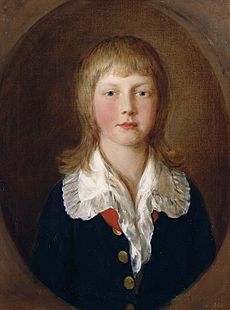
Ernest Augustus was born at Buckingham Palace in London on 5 June 1771. He was the fifth son of King George III and Queen Charlotte. When he was a teenager, he and his younger brothers were sent to Germany. They studied at the University of Göttingen in Hanover. This was his father's territory. Ernest was a good student and learned German.
In 1791, Ernest and his brother Adolphus began military training in Hanover. Ernest was a skilled horseman and a good shot. He quickly became a captain in the cavalry.
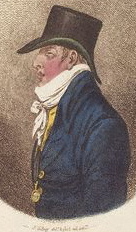
In 1792, Prince Ernest Augustus became a colonel. He served in the War of the First Coalition against France. In 1793, he was wounded in the head near Tournai. This left him with a noticeable scar. In 1794, his left arm was injured by a cannonball. He also lost sight in his left eye. He returned to Britain to recover.
Ernest was promoted to major-general in 1795. He wanted to join British forces fighting in Europe. However, his father and brother refused. He stayed in Hanover for a while. In 1796, he returned to Britain for eye treatment, but it did not help.
Duke of Cumberland and Politics
On 23 April 1799, King George III made Prince Ernest Augustus the Duke of Cumberland and Teviotdale. He also became the Earl of Armagh. He received an allowance of £12,000 a year. He was also made a lieutenant-general. With a seat in the House of Lords, he became involved in British politics.
Ernest held very traditional political views. He became a leader of the right wing of the party. In 1801, he helped form a new government.
Military Leadership and Views
In 1803, the Duke of York appointed Ernest to command the Severn District. This was a military area in England. When war with France started again, Ernest was given a more important command. He improved defenses along the South Coast.
Ernest strongly opposed giving political rights to Catholics in Britain and Ireland. He believed it went against the King's promise to support the Anglican Church. He spoke against it in the House of Lords. Protestant groups in Ireland supported him. He became Chancellor of the University of Dublin in 1805. He also became Grand Master of the Orange Lodges in 1807.
He wanted to join Allied forces fighting France. But he was only sent as an observer. In 1808, he was promoted to full general.
Royal Marriage and Succession
In 1813, Ernest fell in love with his cousin, Duchess Frederica of Mecklenburg-Strelitz. She was a widow. They agreed to marry if she became free. Her husband died in 1814, making her free to marry. They married in Germany on 29 May 1815.
Queen Charlotte, Ernest's mother, did not approve of the marriage. She refused to meet Frederica. The Prince Regent also found their presence in Britain awkward. He offered them money to leave for Europe, but Ernest refused. Despite family problems, Ernest and Frederica had a happy marriage.
In 1815, the marriage seemed unimportant for the British throne. Princess Charlotte, the Prince Regent's only child, was expected to have children. She was the only legitimate grandchild of King George III. But in 1817, Princess Charlotte died after giving birth to a stillborn son. This left King George with no living legitimate grandchildren. Many of his unmarried sons quickly sought wives to ensure the royal succession.
In 1818, the Cumberlands moved to Germany. Life was cheaper there. Queen Charlotte died in 1818. In 1819, Frederica gave birth to a son, Prince George of Cumberland. Ernest occasionally visited England. In 1820, his eldest brother became King George IV. Ernest was now fourth in line to the British throne. This made his political influence in Britain grow.
Public Opinion and Reforms
In 1826, Parliament increased Ernest's allowance. This was to help pay for Prince George's education. The money was given on the condition that Prince George live in England.
In 1829, Ernest strongly opposed a bill to give more rights to Catholics in Ireland. He tried to convince King George IV against it. But the bill passed and became law.
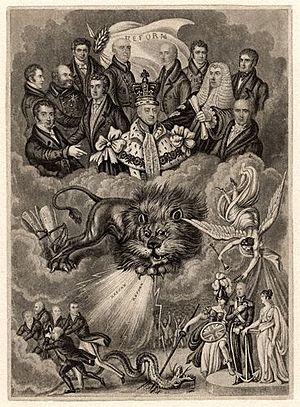
Ernest's influence at court lessened when William IV became king in 1830. William IV had no living legitimate children. Ernest was now the heir to the Hanoverian throne. This was because Princess Victoria, the British heir, could not inherit in Hanover due to their laws.
Ernest opposed the Reform Act 1832. This act aimed to change the voting system in Britain. He was one of the peers who voted against it. His popularity suffered because of his traditional views.
In 1832, Ernest faced accusations from two young women. They claimed he tried to ride them down. It was later found that one of his staff members was the rider. Despite this, newspapers continued to print stories. The same year, Ernest sued for libel and won.
His son, Prince George, became blind. This made it unlikely that George could marry Princess Victoria. It also raised questions about his future as King of Hanover. Ernest continued to attend the House of Lords regularly. He was known for his dedication, though not for long speeches.
King of Hanover (1837–1851)
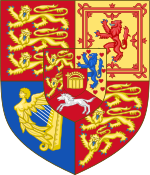
When King William IV died in 1837, Ernest became King of Hanover. He moved there quickly. He was the first Hanoverian ruler to live in the kingdom since 1714.
Developing Hanover and Facing Challenges
The city of Hanover was not very grand when Ernest became king. He worked to improve it. He supported gas lighting for streets and better sanitation. He also helped develop new residential areas.
Ernest was very interested in railways. His support helped Hanover become a major railway hub. This brought great benefits to the country. He also approved the building of an opera house, which opened after his death.
The King traveled weekly to different parts of his kingdom. Anyone could present a petition to him. He allowed people from any social class to hold high government positions. This helped him get skilled ministers. Although he had opposed Catholic rights in Britain, he allowed Catholics to serve in the Hanoverian government. He also gave equal rights to Jews in Hanover.
Ernest supported a common currency and postal union among German states. But he was against the Prussian-led customs union, the Zollverein. He feared it would lead to Prussia controlling Hanover. Instead, he supported the Steuerverein, a different trade union. Hanover eventually joined the Zollverein in 1850 on good terms. His worries about Prussia were correct. Hanover was later taken over by Prussia in 1866.
Hanover was not greatly affected by the revolutions of 1848. Small disturbances were quickly stopped. When agitators came from Berlin, Ernest threatened to leave for Britain with his son. This would leave Hanover open to Prussia. This threat ended the unrest. Afterwards, the King granted a new, more liberal constitution.
Relationship with Queen Victoria
Ernest Augustus had a complex relationship with his niece, Queen Victoria. When Victoria became Queen of Britain, Ernest became King of Hanover. This separated the two crowns.
Soon after becoming king, Ernest had a disagreement with Victoria. She wanted his apartments at St James's Palace for her mother. Ernest refused, wanting to keep a place in London for his visits. This made Victoria angry.
Their relationship worsened when Ernest refused to give precedence to Victoria's future husband, Prince Albert of Saxe-Coburg and Gotha. Ernest believed his status as King of Hanover was higher.
Ernest visited England in 1843. This was his only visit as King of Hanover. At a wedding, he tried to stand in a more important place than Prince Albert. Albert firmly stood his ground. Ernest seemed to hold no grudge. He even invited Albert for a walk. When Albert worried about crowds, Ernest said, "When I lived here I was quite as unpopular as you are and they never bothered me."
The monarchs also argued over jewels left by Queen Charlotte. Victoria believed they belonged to the British Crown. Ernest thought they should go to the male heir, which was him. The matter was debated. Victoria refused to settle it during Ernest's lifetime. She often wore the jewels, which annoyed Ernest. After Ernest's death, his son, King George V, continued the claim. In 1858, the jewels were given to Hanover.
Later Life and Legacy
In 1851, King Ernest Augustus traveled around Germany. He visited the King of Prussia and inspected his old regiment. In June, he celebrated his 80th birthday. He also visited Göttingen, where he opened a new hospital.
King Ernest Augustus died on 18 November 1851, after being ill for about a month. He was greatly missed in Hanover. He and Queen Frederica are buried in a mausoleum in the Berggarten of Herrenhausen Gardens.
A large statue of King Ernest Augustus stands in a square in front of Hanover Central Station. It is a popular meeting spot. People often say they will meet "under the tail" of the horse in the statue.
Titles, Styles and Honours
Titles and Styles
- 5 June 1771 – 23 April 1799: His Royal Highness Prince Ernest Augustus
- 23 April 1799 – 20 June 1837: His Royal Highness The Duke of Cumberland and Teviotdale
- 20 June 1837 – 18 November 1851: His Majesty The King of Hanover
Honours
British and Hanoverian
- Knight of the Garter (KG) – 1786
- Privy Council of Great Britain (PC) – 1799
- Knight of the Order of the Thistle (KT)
- Knight Grand Cross of the Order of the Bath (GCB) – 1815
- Knight Grand Cross of the Royal Guelphic Order (GCH) – 1815; became sovereign of the order in 1837
- Knight of St Patrick (KP) – 1821
- Order of St George – founder and sovereign of the order, 1839
- Fellow of the Royal Society (FRS) – 1828
Foreign
- Grand Cross of Albert the Bear – 1839 (Ascanian duchies)
- Grand Cross of the Order of St. Stephen – 1839 (Austria)
- Grand Cross of the House Order of Fidelity – 1829 (Baden)
- Knight of the Elephant – 1838 (Denmark)
- Grand Cross of the Saxe-Ernestine House Order – 1839 (Ernestine duchies)
- Knight of the Black Eagle – 1815 (Prussia)
- Grand Cross of the Red Eagle (Prussia)
- Grand Cross of the Ludwig Order (Hesse and by Rhine)
- Grand Cross of the Golden Lion – 1818 (Hesse-Kassel)
- Knight of St. Hubert – 1826 (Bavaria)
- Grand Cross of the Military William Order – 1849 (Netherlands)
- Knight of St. Andrew – 1819 (Russia)
See also
 In Spanish: Ernesto Augusto I de Hannover para niños
In Spanish: Ernesto Augusto I de Hannover para niños
 | Jessica Watkins |
 | Robert Henry Lawrence Jr. |
 | Mae Jemison |
 | Sian Proctor |
 | Guion Bluford |


